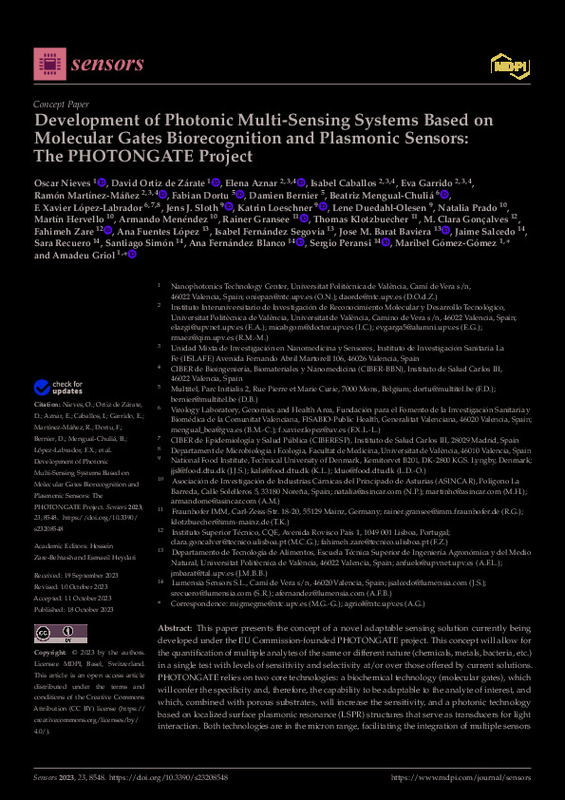|
Resumen:
|
[EN] This paper presents the concept of a novel adaptable sensing solution currently being developed under the EU Commission-founded PHOTONGATE project. This concept will allow for the quantification of multiple analytes ...[+]
[EN] This paper presents the concept of a novel adaptable sensing solution currently being developed under the EU Commission-founded PHOTONGATE project. This concept will allow for the quantification of multiple analytes of the same or different nature (chemicals, metals, bacteria, etc.) in a single test with levels of sensitivity and selectivity at/or over those offered by current solutions. PHOTONGATE relies on two core technologies: a biochemical technology (molecular gates), which will confer the specificity and, therefore, the capability to be adaptable to the analyte of interest, and which, combined with porous substrates, will increase the sensitivity, and a photonic technology based on localized surface plasmonic resonance (LSPR) structures that serve as transducers for light interaction. Both technologies are in the micron range, facilitating the integration of multiple sensors within a small area (mm2). The concept will be developed for its application in health diagnosis and food safety sectors. It is thought of as an easy-to-use modular concept, which will consist of the sensing module, mainly of a microfluidics cartridge that will house the photonic sensor, and a platform for fluidic handling, optical interrogation, and signal processing. The platform will include a new optical concept, which is fully European Union Made, avoiding optical fibers and expensive optical components.
[-]
|
|
Agradecimientos:
|
The micro-nanofabrication capabilities required in the PHOTONGATE project- 101093042 are funded by the Pluri-Regional FEDER funding Plan 2014-2020 European Commission.
This research project has received funding from the ...[+]
The micro-nanofabrication capabilities required in the PHOTONGATE project- 101093042 are funded by the Pluri-Regional FEDER funding Plan 2014-2020 European Commission.
This research project has received funding from the European Union¿s HORIZON-CL4-2022 research and innovation programme under grant agreement ID 101093042, PHOTONGATE project
[-]
|









